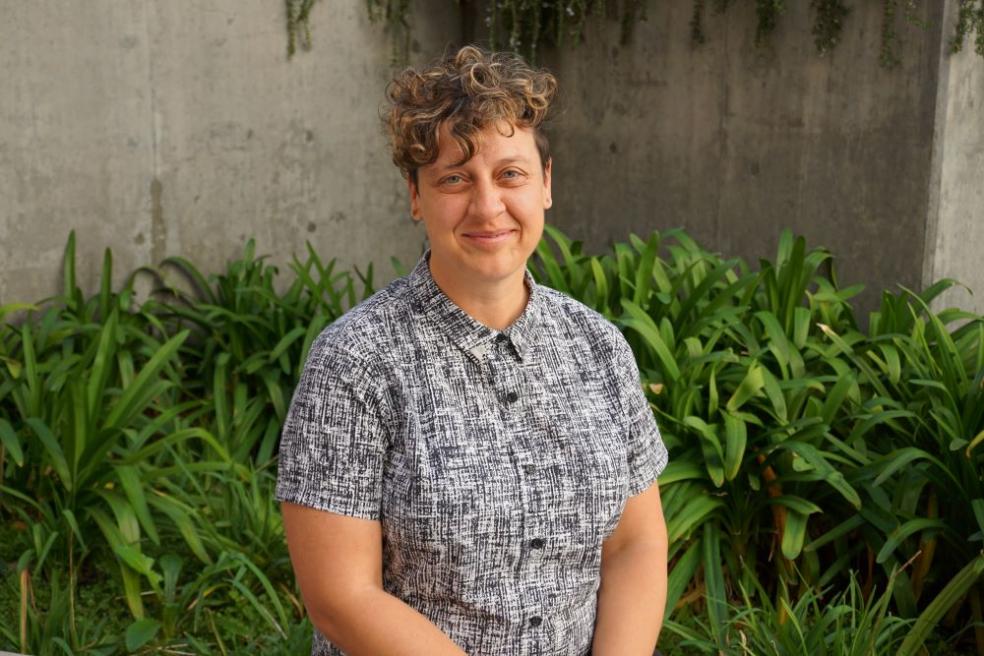
Today, Whatcott is a beacon of inspiration as a professor of Women’s Studies at San Diego State University, empowering undergraduate and graduate students to analyze societal structures and envision pathways to meaningful change. Their interdisciplinary approach, encompassing U.S. history, feminist disability studies, and ethnic studies, fosters a dynamic learning environment where students are encouraged to challenge norms and advocate for equity.
“I love empowering students to think about how the world could be different. What strategies people have used in the past to create change, and what strategies are people using in the present? I want them to think about how we create social change now,” Whatcott says.
Originally hailing from Utah, Whatcott found their way to Humboldt through an exchange program, forever changing the trajectory of their academic and personal pursuits. Whatcott's time at Humboldt was marked by an insatiable thirst for knowledge and a genuine dedication to causes close to their heart.
During their undergraduate years, Whatcott became deeply involved in campus life, immersing themself in various efforts including student radio on KRFH and sustainability initiatives at the Campus Center for Appropriate Technology (CCAT). Reflecting on their time at Humboldt, Whatcott fondly recalls the vibrant community energy and the pivotal role played by centers like the Women's Resource Center in fostering a sense of belonging and solidarity.
Whatcott's commitment to social justice extended beyond the classroom. They became actively involved in grassroots activism, advocating for human rights and challenging systemic injustices. However, it was their anti-war activism in the early 2000s that left a memorable mark on their undergraduate experience, as they rallied hundreds to protest against U.S. military interventions in Iraq and Afghanistan at the UC Quad.
Whatcott's academic journey at Humboldt took a key turn when they discovered the transformative potential of Women's Studies as an undergraduate. Under the mentorship of inspiring faculty members like Women’s Studies professor Kim Berry, Whatcott delved into critical explorations of gender, race, and sexuality, laying the groundwork for their future endeavors in academia. Their experiences at Humboldt ignited a lifelong passion for advancing marginalized voices and perspectives, which Whatcott now tries to inspire in her own graduate students.
“I believe that Humboldt has top-notch faculty and cutting-edge classes. Some Humboldt students have applied to our master's program at SDSU, and I'm excited about it. I believe they will be well-prepared and have a good grasp of the important theories and concepts that we cover. I’m confident that they will succeed in their master's work because I know exactly what education they received at Humboldt,” Whatcott says.
After completing their master's degree at Humboldt, Whatcott continued channeling their academic insights into action. Their journey led them to pursue a Ph.D. at UC Santa Cruz, fueled by the unwavering support and mentorship of Humboldt faculty who believed in their potential.
Whatcott's upcoming book on California's history of eugenics demonstrates their ongoing dedication to uncovering injustices and fostering discussions on reproductive justice and human rights. Their partnership with Duke University Press signifies the culmination of rigorous scholarship and unwavering commitment to amplifying overlooked histories.
In academia and activism, Whatcott's legacy endures as a testament to Cal Poly Humboldt's spirit—a beacon of hope, empowerment, and social justice for generations.
“I immediately fell in love with Humboldt. When I went there, I found so many opportunities for outdoor activities. There's hiking, camping, backpacking, surfing, and even whitewater kayaking, but I also found my passion for social justice. Humboldt is a great place to go if students care about social justice and want to receive a great education in this area,” Whatcott says.
Photo: Jess Whatcott is a professor of Women’s Studies at San Diego State University, inspiring students to analyze societal structures and envision pathways to meaningful change.